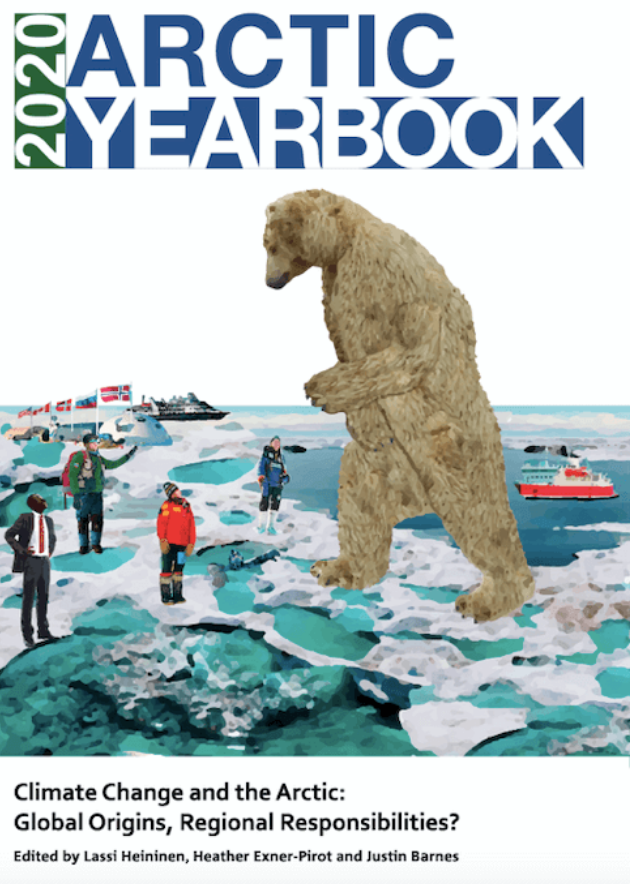The COVID-19 pandemic forces us to consider globalization’s dark side by bringing up new premises of security due to environmental degradation, climate change and pandemics as non-military threats that need to be applied comprehensively. It also supports the importance of scientific research and its applications, digitalization, distance-learning /-working, and open access material for knowledge-building, such as the Arctic Yearbook, when new & proper information is created and distributed for better understanding of global challenges & wicked problems.
The Arctic Yearbook 2020, Climate Change and the Arctic: Global Origins, Regional Responsibilities? was launched at GlobalArctic Model Council’s VIRTUAL in November 2020 with 23 scholarly articles, 8 briefing notes & commentaries that widely covered the theme. Peer-reviewed scholarly articles
analyzed climate change from science and policy viewpoints, many with an emphasis on Arctic geopolitics and resources, the role of the Arctic Council in climate change mitigation, and Indigenous and gender aspects of Arctic climate change.
When we decided 2020's theme with its two-dimensional nature - recognizing the global origin of climate change with the Arctic as a workshop for climate research, and the possible responsibilities & problem-solving approaches needed from this regional point of view – we did not know what was coming. The COVID-19 pandemic has required and supported the importance of scientific research and its applications, digitalization, distance-learning /-working, and open access material for knowledge-building, such as the Arctic Yearbook, when trying to solve global crises & wicked problems.
Generally speaking, in the 2020s there is the existence of advanced high-technology for information, communication and digital distribution of information and knowledge. On the other hand, however, there is a growing need among students, scholars and scientists, other experts, and decision-makers for new information and facts, scientific knowledge, as well as long-distance learning online. We, the Arctic Yearbook, have the capacity, expertise and structure of network, as well as the immaterial capital, i.e. a digital library of a rich collection of more than 190 scholarly articles online, and more than 130 briefing notes & commentaries in nine volumes (since 2012) with a diversity of relevant themes. The nine volumes, all open access, have covered the following themes, each including several scholarly peer-reviewed articles and relevant briefing notes and commentaries (this year’s Arctic Yearbook will be launched in autumn 2021):
- Arctic Strategies (2012)
- The Arctic of Regions vs the Globalized Arctic (2013)
- Human Capital in the North (2014)
- Arctic Governance and Governing (2015)
- The Arctic Council: Twenty Years of Policy Shaping (2016)
- Change and Innovation (2017)
- Arctic Development: In Theory and In Practice (2018)
- Redefining Arctic Security (2019)
- Climate Change and the Arctic: Global Origins, Regional Responsibilities? (2020)
- Defining and Mapping the Arctic: Sovereignties, Policies and Perceptions (2021)
This makes the Yearbook a leading international Arctic peer-reviewed journal in a few fields, such as IR, Arctic shipping, state policies, and on the Arctic Council. Due to its open access nature, these articles share Arctic social science research far beyond the halls of academia, receiving tens of thousands of reads. An active social media presence - more than 4000 followers - has allowed the Yearbook to further disseminate Arctic research to new audiences.
The AY’s application, peer review, and copy-edit processes are truly author centred. Many early-career scientists (post-docs, PhD candidates) and senior researchers appreciate the Yearbook due to the rich variety of themes, and its style, nature, fast peer-review process, as well as its visibility on social media. Arctic Yearbook consistently provides high quality, peer-reviewed articles from diverse researchers of Arctic social science and the humanities. It is an idea, initiative, and institution that is issue-driven by experts that deserves to be recognized and used by Arctic communities. It is also a perfect platform for discussing local – global issues regarding the current state of the world that deserves to be used by a global audience. All of this is an achievement, as the Yearbook is published by the UArctic Thematic Network on Geopolitics and Security and has run on volunteer efforts since its initiation. Big thanks to Arctic Portal’s invaluable role in hosting the website. In addition, only small contributions (e.g. by UArctic) have been had to assist with launch events, cover design and printing. Instead, the AY’s application is built on several strengths as prerequisites for success – a kind of philosophy based on expertise, networking based on individuals, willingness & capabilities, and encouragement & innovations. All this has allowed the Yearbook to remain independent, quick and flexible, and focused on publishing new research findings rather than being occupied with seeking funding.
All in all, we could have hardly foreseen that the AY would be such a perfect platform for this kind of exceptional situation, when everything is put online, and while there is an excess of mis/disinformation being spread. As an international, interdisciplinary, online journal with open access, Arctic Yearbook provides accessible, reliable information in a sea of pay-walled articles and internet myths. As well as a high-quality forum for ideas and research about Arctic politics, governance and development, established at a time when open access was still a relatively new idea. It is possible to say that Arctic Yearbook is one of the most innovative & successful things in Arctic research recently. Therefore, it would also be logical that UArctic will maximally use and utilize this resource which is created, openly distributed, and further developed by the TN on Geopolitics and Security, one of the UArctic's TNs. We ask for your political and moral support, as well as assistance to make Arctic Yearbook better known among students of UArctic universities and other member institutions, and used more in teaching and supervision by teachers and supervisors.
* * *
Lassi Heininen, Editor (E-mail: lassi.heininen@ulapland.fi)
Heather Exner-Pirot, Managing Editor (E-mail: exnerpirot@gmail.com)
Justin Barnes, Assistant Editor (E-mail: jbarnes@balsillieschool.ca)
Arctic Yearbook 2020: Heininen, L., H. Exner-Pirot, & J. Barnes (eds.) Arctic Yearbook 2020. Akureyri, Iceland: Arctic Portal. Available from https://www.arcticyearbook.com
ISSN 2298–2418
